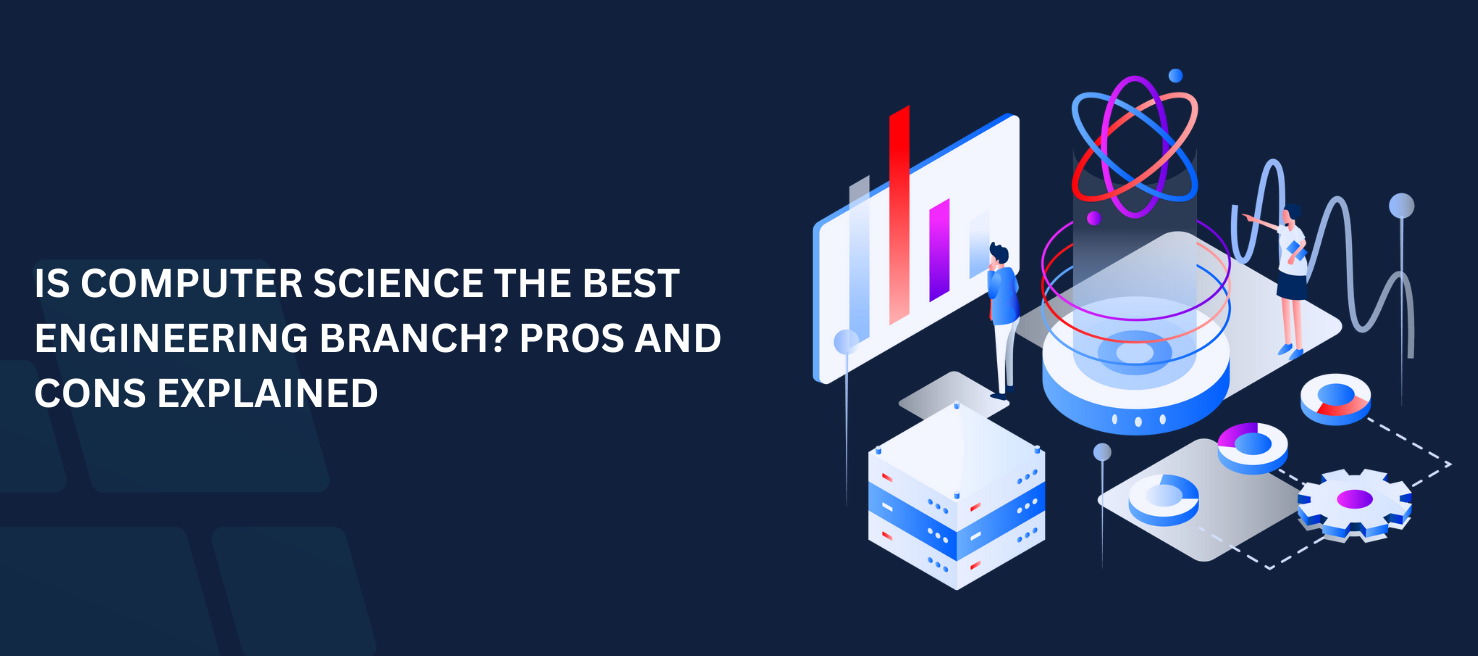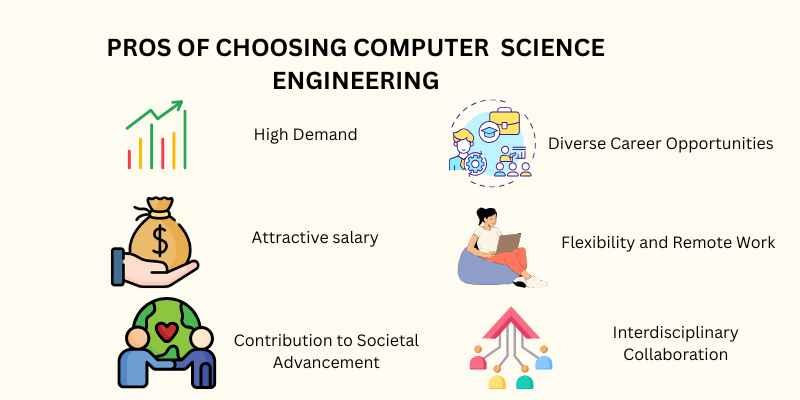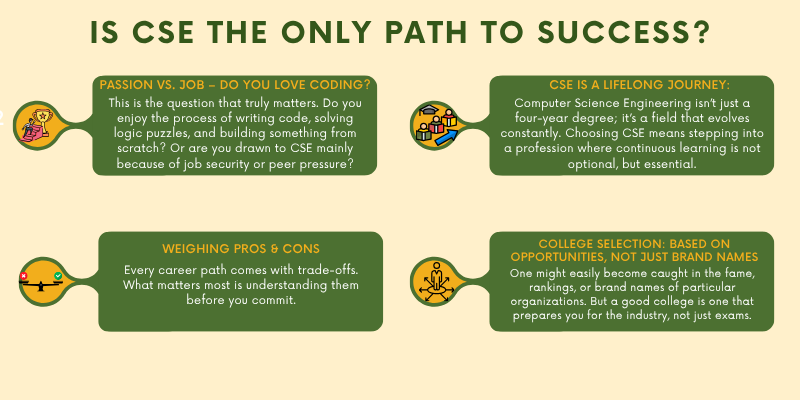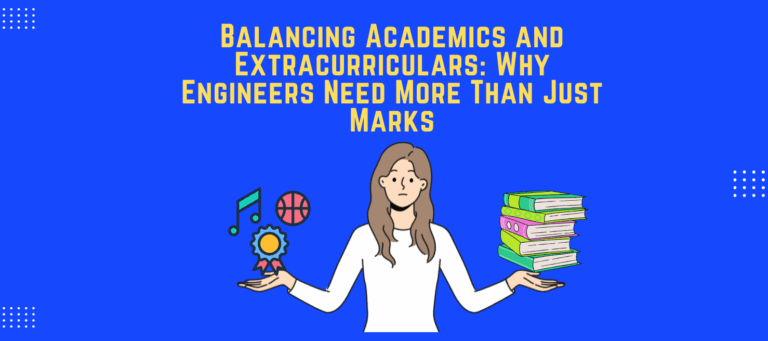
Engineering has seen remarkable growth in the past decade, becoming a top career choice for millions across India. With more than 1.5 million engineering graduates annually, this industry is still growing, particularly as a result of the development of technologies like automation, cloud computing, data science, and artificial intelligence. As digital transformation spreads across industries, the need for tech-savvy engineers is only expected to grow.
Among various specializations such as mechanical, civil, and electronics engineering, Computer Science Engineering (CSE) often stands out as the most popular choice. However, should we select a branch solely based on current trends? It’s essential to consider long-term career goals, learning opportunities, and future adaptability. Moreover, students who secure admission to CSE programs at tier 2 or tier 3 institutes may not receive the same level of exposure or benefits as those at top-tier government engineering colleges. Therefore, students often find themselves in a tough spot when in a top college, they qualify for branches besides CSE and at the same time, they can study CSE at a tier-2 or tier-3 college.
So, what should you choose? Can you really make up for the differences between these colleges on your own? Is there enough online material out there to bridge the gap? Would it be that bad to choose a different branch at a well-known college? Do you need to follow what everyone else is doing? These are common questions that come to mind.
In such cases, it’s essential to consider long-term career goals, learning opportunities, and future adaptability. While CSE may seem attractive, evaluating the reputation and resources of an institute can be crucial. Ultimately, focusing on acquiring skills and experiences that stand out in the job market can make a significant difference, regardless of the branch or institution.
In this blog, we’ll break down the pros and cons of Computer Science Engineering, compare it with other branches, and explore what really matters when choosing your specialisation in 2025 and beyond.
Why is this understanding important?
Any student choosing an engineering branch after 12th shouldn’t be just about trends or peer pressure; it’s about setting the direction for your next four years and beyond. While Computer Science Engineering (CSE) offers high demand and great salary potential, that alone doesn’t make it the right fit for everyone.
If you genuinely enjoy technology, problem-solving, or building digital solutions, CSE can be a deeply rewarding field with diverse career opportunities.
If coding feels like a chore or tech doesn’t excite you, forcing yourself into CSE can lead to years of struggle and burnout. Choosing a field aligned with your strengths, be it design, mechanics, electronics, or civil structures, can lead to long-term satisfaction and success.
And remember: Not choosing CSE isn’t the end of the world. Many students thrive in other engineering branches and find fulfilling, high-impact careers in their own domains.
Four years spent enjoying your subject is far better than four years spent surviving in the wrong one.
What is the Current Position of Computer Science in the 2025 Market?
The next 5–10 years are set to redefine the value of Computer Science graduates in the job market. As businesses across the world go digital-first, the demand for CSE talent is expected to rise sharply. Fields like AI, machine learning, cybersecurity, data engineering, and cloud computing are becoming core to how companies operate, not just in tech, but in finance, healthcare, education, and beyond.
By 2030, over 75% of new job roles in engineering will require strong computing and data skills, according to global workforce reports.
This shift means students choosing Computer Science today are preparing not just for jobs that exist now, but for the high-growth careers of the future.
Should You Follow the Crowd or Follow Your Interests?
It’s easy to be influenced by what seems to be the most popular path. High packages, global job demand, and the flexibility of remote work often make Computer Science Engineering (CSE) appear like the most promising option. In fact, a 2024 report by NASSCOM stated that India’s tech sector is expected to employ over 5 million professionals by 2026, largely driven by demand in software, AI, and data roles.
While CSE is booming, other engineering branches are also evolving with strong career potential:
- Mechanical and Electrical Engineering are gaining relevance in sectors like electric vehicles (EV), automation, and robotics.
- Civil Engineering is being reshaped by smart city initiatives, green buildings, and infrastructure development.
- Chemical Engineering is vital in renewable energy, environmental tech, and pharmaceuticals.
- Biotechnology is growing rapidly due to innovations in healthcare, agriculture, and genetic research.
These fields may not make headlines like AI or coding bootcamps, but they offer meaningful careers, innovative roles, and strong growth if your interest lies there.
Following your passion can lead to both fulfilment and success. So, before choosing CSE just because “everyone is doing it,” ask yourself:
Ask yourself:
- Do you genuinely enjoy problem-solving and logical thinking?
- Does writing code excite you or drain you?
- Would you be okay spending hours in front of a screen debugging issues?
Choosing a branch just because “everyone else is doing it” or “it pays well” can backfire if you don’t enjoy the work. A career in tech requires persistence, continuous learning, and a genuine interest in tech. Without that, even the best opportunities can feel unfulfilling.
Passion leads to purpose. Demand might get you a job, but interest will help you build a career.
Pick a path that aligns with your strengths and curiosity. Whether it’s computer science or any other branch, your engagement with the subject will ultimately define your success.
Why Computer Science is Considered the Best Option Compared to Other Branches?
Computer Science Engineering (CSE) has become one of the most promising and revolutionary fields in the contemporary digital era, not just because it’s popular, but also because of its practical applications. Due to the internet’s increasing importance in daily life and the rapid advancement of technology, innovation is now required in all sectors of the economy.
The scope and complexity of possibilities in CSE are always growing, whether they are related to data analytics, cybersecurity, or artificial intelligence. Students are drawn to this dynamic field more and more because of the intellectual challenges and opportunities for creative problem-solving it presents, in addition to the employment opportunities it offers.
Let’s explore why more students and companies are turning toward Computer Science over traditional branches like Mechanical, Civil, or Electrical.
1. Highest Employability Rates in the Engineering Sector
It’s a well-known fact now that Computer Science graduates are more employable than their peers from other streams. According to a new data from the All India Council for Technical Education (AICTE), about 78% of CSE graduates find employment within six months of graduation. In contrast, placement rates for Mechanical and Civil branches are much lower at around 54% and 42%, respectively.
This isn’t just because tech companies are hiring; industries like healthcare, finance, agriculture, and logistics are actively building digital infrastructures and need CSE professionals to do so.
2. Attractive Salary Packages
Another major reason students prefer Computer Science is the earning potential. Entry-level salaries for CSE graduates range from ₹6–9 LPA, with top-tier institutions like IITs and IIITs offering packages of up to ₹50 LPA or more from companies such as Google, Amazon, and Microsoft. Moreover, the global demand for skilled developers and data scientists is also pushing salaries even higher, especially for remote roles in the US, UK, and Europe.
Compare this to the average package offered by other branches. Although top IITs and NIITs offer much better packages, the average all over India is still less.
- Mechanical Engineering: ₹3.5 to 5 LPA
- Civil Engineering: ₹3 to 4.5 LPA
- Electrical Engineering: ₹4 to 6 LPA
3. Numerous Career Options with Room to Grow
One of the best things about CSE? You’re not stuck in a single type of job. With the right skills, you can become a:
- Software Developer
- Data Analyst or Data Scientist
- Machine Learning Engineer
- Ethical Hacker
- Cloud Architect
- AI/ML Researcher
- Game Developer
- Web/App Developer
- Product Manager
- Tech Entrepreneur
In fact, the LinkedIn Emerging Jobs Report 2024 shows that 6 of the top 10 fastest-growing careers in India are in the Computer Science domain.
4. Global Opportunities & Remote Work Culture
Unlike core branches that often require on-site or fieldwork, CSE professionals enjoy the flexibility of working remotely from anywhere in the world. This means a CSE graduate in India can work for a Silicon Valley startup or a European fintech company without ever leaving home.
With the global tech talent shortage, Indian developers are now recognised as a top resource pool, particularly in fields such as AI, DevOps, and Cybersecurity.
5. Booming Startup & Freelance Ecosystem
If you’re someone who dreams of building your own product or freelancing, CSE gives you a major edge. From creating mobile apps to automating business solutions, CSE skills help you launch startups or freelance on platforms like Upwork and Fiverr.
- Every day, more than 3 new tech startups emerge in India. As of December 2024, India officially ranked as the third-largest startup ecosystem globally, with over 159,000 startups recognized under the Startup India program
- In 2023 alone, India saw the launch of over 1,400 new tech startups, a strong signal of ongoing growth and opportunity .
6. Fastest-Adapting and Evolving Curriculum
Computer Science is a branch that constantly updates itself to match real-world needs. Courses on AI, Blockchain, Quantum Computing, Web3, and Cybersecurity are now offered at many colleges. In contrast, traditional engineering branches often take years to update their curriculum.
A recent stats in 2025 revealed a 65% rise in admissions to CSE and AI-related specialisations, while other branches witnessed stagnant growth.
CSE vs Other Engineering Branches: A Comparative Look
Choosing an engineering branch isn’t just about interest; it also impacts your career scope, salary, and future adaptability. With rapid tech growth, Computer Science Engineering (CSE) is often seen as the frontrunner, but how does it really compare to other core branches? Here’s a data-backed comparison of key factors to help you evaluate better.
| Factor | Computer Science (CSE) | Mechanical | Civil | Electrical | Chemical |
| Average Starting Salary (India) | ₹8–12 LPA (Top roles) | ₹3.5–5 LPA | ₹3–4.5 LPA | ₹4–6 LPA | ₹3.5–5 LPA |
| Global Opportunities | Very High – US, Europe, Canada, UAE actively hire software professionals | Moderate – Mostly in core manufacturing hubs (Germany, Japan) | Low – Limited to infra-driven markets | Moderate – Middle East and energy sectors | Low – Mostly limited to niche sectors |
| Remote/Hybrid Work Roles | 80%+ of companies offer flexibility | Rare | Rare | 10–20% | Rare |
| Annual Job Openings (India, est.) | 2M+ in software, AI, data, cloud (NASSCOM 2024) | ~1.2L | ~1L | ~1.3L | <75K |
| Top Hiring Sectors | IT, FinTech, AI, EdTech, Startups, Global MNCs | Manufacturing, Automotive, Aerospace | Real Estate, Infrastructure, Govt. Projects | Power, Renewable Energy, Electronics | Pharma, Fertilizers, Petrochemicals |
| Learning Curve | Continuous – Needs upskilling every 6–12 months | Moderate – Hands-on and stable concepts | Moderate – Field-focused, structural | High-theory-intensive and evolving | High–Theory + lab-heavy, chemical safety laws apply |
| Future Growth Outlook (2025–2030) | Projected CAGR: 8.5 %+ in tech roles | Stable but saturated | Stable – Govt-driven | Moderate – Green energy push helping | Shrinking – Automation reducing demand |
Real Industry Trends and Data Supporting CSE Dominance in 2025
Cloud usage, AI-led automation, and the quick expansion of digital transformation have all contributed to the record-high need for computer science specialists.
Here are some key industry-backed trends:
- India’s IT and business services sector is projected to reach $245 billion by the end of FY2025, according to NASSCOM. This growth is driven largely by the need for skilled software developers, AI engineers, cybersecurity analysts, and cloud architects, all core roles within CSE.
- AI and machine learning job postings in India grew by over 30% year-on-year, based on LinkedIn and TeamLease reports. These technologies are increasingly integrated into sectors like healthcare, finance, logistics, and manufacturing, all requiring CSE expertise.
- Cloud computing roles are projected to grow at a 14–18% CAGR until 2030, as enterprises continue to shift their infrastructure to scalable, digital environments. Engineers with cloud certifications and computer science foundations are in high demand.
- With the World Economic Forum predicting over 97 million new digital jobs by 2030, many of which come under the CSE area, data science and analytics positions are among the fastest-growing employment categories in the world.
- Startups and digital product companies in India raised over $8 billion in early-stage funding in 2024 alone, fueling demand for full-stack developers, backend engineers, and DevOps professionals.
These numbers reflect a clear shift: Computer Science is no longer a niche; it’s foundational to how modern industries operate and grow. For students choosing their path in 2025, CSE offers not just job opportunities but a direct entry into the engines of innovation across every major sector.
Future Scope of CSE: What’s Next
Artificial intelligence, data science, and blockchain technologies are transforming how businesses operate and make decisions. These fields are not just electives anymore. They are becoming essential components of modern computer science education and careers.
AI and Data Science Dominate
Data science and artificial intelligence (AI) are necessary to the advancement of technology. The World Economic Forum predicts AI will replace 85 million jobs but create 97 million new ones by 2025, the majority requiring expertise in computer science. From personalized healthcare and intelligent assistants to fraud detection and autonomous vehicles, AI and data are redefining how systems learn, decide, and adapt. CSE graduates are equipped with the algorithms, tools, and programming knowledge needed to build and optimize these systems.
Digital Transformation Is Accelerating
Post-pandemic, industries across the board, including manufacturing, logistics, retail, and construction, are rapidly adopting IT solutions for process automation, supply chain intelligence, and customer engagement. Technologies like cloud computing, DevOps, and IoT are no longer optional but central to business survival and growth. CSE offers the foundational skills to design and manage this digital infrastructure.
Blockchain and Web3 Ecosystems
Blockchain is gaining momentum beyond cryptocurrencies. It’s being used for secure transactions, decentralised identity management, smart contracts, and transparent supply chains. As industries explore Web3 and decentralized platforms, the need for blockchain developers, cryptographic system designers, and smart contract engineers, all CSE-rooted roles, is rapidly rising.
Government Push for Digital India
Initiatives like the Digital India mission, the National AI Strategy, and the Data Governance Framework are actively building a digital ecosystem that depends on a robust tech workforce. Public sector digitalization from e-governance to digital health records requires engineers fluent in data handling, AI models, cybersecurity, and cloud deployment. CSE directly aligns with these national goals.
Startup Ecosystem Booming
Every year, thousands of startups are founded to create platforms, tools, and apps that address important issues in the real world. These companies run lean, fast, and digital, and they’re constantly hiring full-stack developers, AI engineers, DevOps experts, and data analysts. If you know how to build, you’re in demand.
CSE Roles Are Borderless
You can sit in one city and work for a product company halfway across the globe. More than any other branch, CSE or Tech companies all over the world are hiring Indian graduates for remote roles because skills matter more than location. If you have the right skills, your zip code doesn’t matter anymore.
New-Age Jobs Are Born from Tech
Careers that didn’t exist five years ago, like ML ops engineer, data product manager, blockchain architect, or UX developer for AI tools, are now growing rapidly. And almost all of them are rooted in core computer science knowledge.
Top Recruiters for Computer Science Engineering Graduates in 2025
In 2025, Computer Science Engineering (CSE) graduates in India are in high demand across various industries. Renowned businesses are actively looking for CSE specialists to propel innovation in fields including data analytics, cloud computing, cybersecurity, and artificial intelligence.
Global Tech Giants
- Google: Offers roles in software development, data analysis, and cloud solutions.
- Microsoft: Seeks CSE professionals for software engineering, cloud architecture, and AI research roles.
- Amazon: Provides opportunities in software development, systems engineering, and data science.
- Meta (formerly Facebook): Recruits for software development, AI, and user experience design positions.
Indian IT Powerhouses
- Tata Consultancy Services (TCS): Offers roles in software development, IT consulting, and systems integration.
- Infosys: Recruits for software engineering, data analytics, and digital transformation projects.
- Wipro: Provides opportunities in cloud computing, cybersecurity, and AI-driven solutions.
- HCL Technologies: Offers roles in application development, system integration, and digital solutions.
Emerging Tech Startups and Unicorns
- Flipkart: Seeks CSE graduates for software development, data analytics, and system architecture roles.
- Paytm: Offers positions in mobile application development, cybersecurity, and data analysis.
- Byju’s: Recruits for software development, AI integration, and user experience enhancement.
- Ola: Provides roles in software engineering, data science, and app development.
Global Capability Centers (GCCs) and Financial Institutions
- Goldman Sachs: Through its Engineering Campus Hiring Program, offers roles in software development, data engineering, and financial technology solutions.
- Guidewire Software: Plans to double its India workforce, focusing on hiring for software development and professional services roles.
- Broadridge Financial Solutions: Aims to increase its India tech staff by 26% over three years, seeking roles in software engineering and technology modernization.
Sector-Specific Recruiters
- RackBank Data Centers: Leading the development of India’s first AI-focused Special Economic Zone in Chhattisgarh, offering opportunities in AI, data science, and high-performance computing.
- London Stock Exchange Group (LSEG): Shifting several technology roles to India, establishing a technology center of excellence in Hyderabad, and recruiting for engineering and product development roles.
These organizations represent a snapshot of the vast opportunities available to Computer Science Engineering graduates in 2025 and the coming years. With the tech industry’s continuous evolution, CSE professionals are well-positioned to lead innovations and drive digital transformation across various sectors.
Which Career Paths Are Best for Computer Science Engineering?
One of the biggest advantages of studying computer science is its versatility. Unlike some traditional branches that may lead to narrowly defined roles, CSE opens doors across a spectrum of job profiles. Here’s a breakdown of top career options:
| Role | Typical Responsibilities | Avg Freshers’ Salary (INR LPA) |
| Software Developer / Engineer | Builds and maintains software across industries | ₹3–6 LPA |
| Full Stack Developer | Handles both frontend and backend development for web/mobile apps | ₹4–8 LPA (higher in startups) |
| Data Scientist / Analyst | Analyzes data and builds predictive models | ₹5–6 LPA |
| AI & ML Engineer | Develops AI models and automates decision systems | ₹5–8 LPA (based on ML/data roles) |
| Cybersecurity Analyst | Shields data and systems from online attacks. | ₹4–6 LPA (growing demand) |
| Cloud Solutions Architect | Designs and deploys applications/infrastructure on cloud platforms | ₹6–9 LPA (AWS/Azure certified) |
| Blockchain Developer | Builds decentralized apps and smart contracts | ₹4–7 LPA (niche but growing) |
| DevOps Engineer | Automates software delivery, testing, and deployment pipelines | ₹5–8 LPA (in high-demand roles) |
These career paths often lead to global opportunities, ongoing high salaries, remote work flexibility, and leadership roles.
Pros of Choosing Computer Science Engineering

Although there are difficulties, CSE has many advantages that make it an excellent career choice:
1. Diverse Career Opportunities
CSE graduates are not limited to the tech industry. Their skills are applicable in healthcare, finance, education, entertainment, and more, allowing for versatile career paths.
2. High Earning Potential
The demand for skilled CSE professionals often translates to competitive salaries and attractive job offers, especially for those with specialized expertise.
3. Global Job Market
CSE skills are universally valued, providing opportunities to work in various countries and cultures, either on-site or remotely.
4. Entrepreneurial Ventures
With the rise of the digital economy, CSE professionals have the tools to launch startups, develop innovative applications, or offer freelance services, fostering entrepreneurial growth.
5. Contribution to Societal Advancement
CSE plays a pivotal role in addressing global challenges, from developing healthcare solutions to enhancing educational platforms, thereby contributing to societal progress.
6. Continuous Learning and Innovation
For those passionate about learning, CSE offers an ever-evolving landscape filled with opportunities to explore new technologies and innovate.
7. Flexibility and Remote Work
The nature of CSE work often allows for flexible schedules and remote work options, promoting better work-life integration.
8. Interdisciplinary Collaboration
CSE professionals frequently collaborate with experts from various fields, leading to a richer work experience and the development of multifaceted solutions.
The Challenges of Choosing Computer Science
Even the most in-demand field comes with its own set of challenges. CSE is rewarding, but it’s also rigorous, and success in this space demands more than just interest. Here’s what students need to understand before diving in:
The Rigorous Nature of the Curriculum
The CSE curriculum is challenging, combining theoretical foundations with continuous hands-on coding. It demands consistent effort, time management, and a disciplined approach from the very beginning.
Constant Learning Curve
The tech landscape changes rapidly, and new tools, frameworks, and languages emerge frequently. To stay relevant, students and professionals must continuously upskill beyond the classroom.
Too much Theory + Continuous Practice Pressure
Mastering CSE isn’t just about clearing exams. You’ll also need to build projects, participate in hackathons, and contribute to open-source, all while keeping up with your college load.
Physical and Mental Strain
Spending long hours on screens can lead to back pain, eye strain, and burnout. Without strong time and stress management, the journey can become overwhelming.
High Competition in the Job Market
Every year, thousands of students graduate with a CSE degree, making it one of the most competitive fields. To stand out, students need more than just good grades; they must build strong portfolios, gain practical experience through internships, and consistently update their skills to meet industry expectations. What Recruiters actually seek is a strong portfolio with examples of real-world problem-solving and an urge for consistent learning.
Getting Noticed Needs Extra Effort
Top tech roles often demand GitHub contributions, certifications, internships, or hands-on product development skills not always taught in class.
Work-Life Balance Can Suffer
One major con of pursuing a CSE degree is that work-life balance can often suffer. Tight deadlines, late-night deployments, and startup culture frequently demand long hours and constant learning. This pressure can lead to burnout, making it challenging for graduates to maintain personal relationships and enjoy downtime.
Is CSE the Only Path to Success?

Computer Science may offer some of the highest-paying roles in today’s job market, but let’s be clear: it’s not the only path to a successful or fulfilling career.
Many students see CSE as a fast track to financial stability. And while that can be true, success isn’t measured by salary alone. It’s about doing work that excites you, challenges you, and adds meaning to your day-to-day life.
Passion vs. Job – Do You Love Coding?
This is the question that truly matters. Do you enjoy the process of writing code, solving logic puzzles, and building something from scratch? Or are you drawn to CSE mainly because of job security or peer pressure?
If building software excites you, coding-centric roles may be your space to grow.
If not, then spending four years struggling through something you’re not passionate about might not be worth it, even if it “pays well.”
So ask yourself:
- Do I enjoy writing code and turning logic into real-world applications?
If yes, software development, app building, or systems programming may be ideal. - Am I passionate about solving real-world problems through technology?
Whether it’s in healthcare, climate, or education, do you see tech as a way to create impact? - What about CSE excites you the most?
Think large-scale apps, cloud platforms, or smart technologies. Does that challenge excite you? - Or is my interest somewhere else, like automation, data science, UI/UX, or digital innovation?
Tech is vast. Knowing what excites you helps you find where you truly fit. - Do you have the patience to solve problems that may take hours or weeks
If the answers align with what Computer Science offers, you’re on the right track. But suppose your passion lies in designing machines, building infrastructure, exploring energy systems, or hands-on engineering. In that case, other branches might suit you better and still lead to equally successful careers.
The real win is finding the field where your interest meets opportunity.
In today’s world, success isn’t tied to just one stream. Great careers are built in every branch. What matters is your willingness to stay curious, learn consistently, and grow with your chosen path, not just follow trends.
CSE is a Lifelong Journey:
Computer Science Engineering isn’t just a four-year degree; it’s a field that evolves constantly. Choosing CSE means stepping into a profession where continuous learning is not optional, but essential.
- New technologies emerge rapidly. Every few years, dominant programming languages, tools, and frameworks change. What you learn in college might not be enough to keep you competitive unless you continue to upskill.
- Tech professionals must stay relevant. Whether it’s AI, blockchain, cloud, or cybersecurity, industries expect engineers to stay updated with the latest advancements. Certifications, online courses, and real-world projects become part of your career journey.
- Growth depends on adaptability. If you’re someone who enjoys learning, solving new problems, and exploring innovations, CSE can be incredibly rewarding. But if you’re looking for a fixed skillset with minimal change, this path may feel overwhelming.
- It’s a mindset, not just a major. Success in CSE isn’t just about cracking college exams; it’s about building a mindset of curiosity, resilience, and lifelong adaptability.
Weighing Pros & Cons
Every career path comes with trade-offs. What matters most is understanding them before you commit.
Pros of Choosing CSE:
- High demand across sectors (tech, finance, healthcare, etc.)
- Excellent salary packages and global opportunities
- Flexible career paths (developer, analyst, researcher, etc.)
- Remote work and freelancing possibilities
- Rapidly growing fields like AI, ML, and cybersecurity
Cons of Choosing CSE:
- Requires continuous upskilling and learning
- High competition among graduates
- Physically sedentary and screen-heavy lifestyle
- Work-life balance can be difficult during product deadlines
- Risk of burnout if you’re not passionate about tech
Make a list of what resonates with you the most and reflect on how well you’re suited for the long-term demands of the field.
Here’s what truly matters when selecting a college for CSE:
- Curriculum relevance: Are they teaching AI, cloud, DevOps, or still stuck in outdated tools?
- Industry exposure: Do students work on real projects or just lab manuals?
- Placement strategy: Are mock interviews, resume reviews, and soft-skill sessions part of the college’s DNA?
- Alumni network: Do you see past students working at respected companies or building startups?
- Internship culture: Are internships encouraged from early semesters or reserved for final year checkboxes?
Conclusion
Computer Science Engineering (CSE) is one of the most popular and fast-growing branches in today’s world. It offers great career options in fields like AI, data science, cybersecurity, and software development. With high demand, good salaries, and remote work opportunities, many students see CSE as a smart choice. But remember, just because CSE is in demand doesn’t mean it’s the right fit for everyone.
Ask yourself: Do I truly enjoy technology, problem-solving, and building things? Or am I picking this branch just because others are doing it?
Frequently Asked Questions
1. Will choosing Computer Science guarantee me a job after graduation?
Not automatically. CSE opens up many job opportunities, but getting hired depends on your skills, internships, and real-world project experience. Focus on learning, not just passing exams.
2. What if I don’t enjoy coding—should I still choose CSE?
Not necessarily. With AI and no-code tools, many tech roles now require less manual coding. If you’re interested in tech but not coding, you can still explore areas like UI/UX, QA testing, cybersecurity, or product management. CSE is broad; pick a path that matches your strengths and interests.
3. Is it better to study CSE in an average college or another branch in a top college?
It depends. CSE in a top college brings stronger placements and exposure. But in an average college, you’ll need to work extra hard to stand out. Choose based on your learning style, opportunities, and long-term goals.
4. Is Computer Science really the highest-paying engineering branch?
Yes, generally. Computer Science often leads to high-paying roles in software development, data science, AI, and cybersecurity. However, salaries depend on skills, job role, company, and location, not just the branch itself.
5. Do I need to be good at math to succeed in Computer Science?
A basic foundation in math is important, especially for areas like algorithms, data science, and machine learning. But success comes more from problem-solving and logical thinking than advanced math alone.
6. What are the alternatives to Computer Science for tech careers?
You can explore Electronics (ECE), Information Technology (IT), or Data Science branches. Many roles in the tech industry are interdisciplinary, and hiring is often skills-first rather than branch-specific.
7. Is the competition too high in Computer Science?
Yes, it’s highly competitive, especially in top colleges. But it also has more opportunities, both in India and abroad. Staying ahead requires continuous skill-building, project work, and networking.
8. How do I stay ahead of the competition in CSE?
Build real-world projects, keep learning new tools like AI or cloud, and practice coding regularly. A strong GitHub, certifications, and networking can set you apart.
9. Should I focus on internships or academics only?
Balance both. Academics give you the base, but internships offer real-world experience. Together, they make you job-ready.



